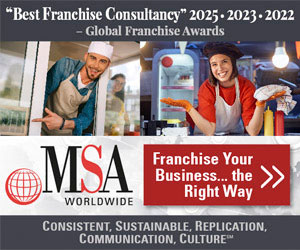Tax-Deferred Exchanges: A Creative Financing Tool for Franchisees
Smart franchisees are always looking for ways to increase cash flow and reduce expenses. One strategy to consider for improving the bottom line is to replace a franchise property with one in a better location or to upgrade franchise equipment. Franchisees can use a creative financing tool, 1031 exchanges, to defer capital gains and recaptured depreciation taxes when purchasing real and personal property of equal or greater value. Savings on deferred taxes represent interest-free loans for higher-yielding acquisitions. Successful completion of a 1031 exchange depends on finding eligible replacement property and meeting identification and transaction deadlines.
How a 1031 exchange works
Tax-deferred exchanges, also known as 1031 exchanges, are enforced by the IRS. According to IRS Code Section 1.1031, no gain is recognized on property held for productive use in business or investment when exchanged for like kind business or investment property. Property denotes real and personal property. The replacement property must be of equal or greater value than the property sold, or a tax is triggered on the difference. The franchisee must identify replacement property within 45 calendar days and complete the transaction within 180 calendar days. (Extension of the identification timeline and exchange completion can be granted given presidentially declared disasters including flooding, tornadoes, hurricanes, fires, terroristic or military action, or Exchangor (taxpayer) serving in a combat zone.)
Examples of eligible replacement property options include:
- land and improvements;
- improvements to an existing building;
- improvements to land already owned; and
- leasehold interests.
Franchisees can upgrade equipment and defer taxes when replaced with the same like kind, like class of furniture, cooking equipment, refrigeration, and fixtures. The franchisee's accountant can classify like kind equipment based on 13 general asset classes or the North American Industry Classification System (NAICS). The accountant can also determine whether it makes sense to initiate an exchange when the gain on personal property is sold.
The qualified intermediary is responsible for drafting the exchange documents and holding the exchange funds in a safe, segregated, liquid escrow account. A person who has acted as the Exchangor's employee, attorney, accountant, investment banker, broker, or real estate agent within the two-year period before the exchange cannot serve as a qualified intermediary. Routine financial title insurance, escrow, or trust services will not be taken into account.
1031 exchange benefits
Franchisees can engage in exchanges for the reason of consolidation, relocation, diversification, appreciation, cash flow, and depreciation. A 1031 exchange allows for the indefinite use of taxable dollars interest-free toward the replacement property. However, the transaction is not tax-free, and the tax obligation is deferred or pushed forward indefinitely until the replacement property is sold. If the personal property is not exchanged, then the tax is paid on the personal property. The interest-free loan or principal provides a return given the time value of money and appreciation of the replacement property. The potential risk is a higher tax rate than the return on the principal when the taxes are eventually paid.
1031 exchange strategies
Depending upon whether the new property is a built to suit, starting with raw land, or improvements are made to an existing site will determine if a reverse or forward exchange is structured by the qualified intermediary. If improvements or a build to suit are not required, then most likely this will be a forward exchange, in which the taxpayer closes on the old property first and then completes the transaction for the replacement property. If improvements or a build to suit are needed, the steps can be either a forward or a reverse exchange. In a reverse, the new property is acquired first followed by the identification of improvements and old property to be sold, constructing the improvements, and selling the old property.
How to avoid potential risks
Timing is crucial for successful completion of a 1031 exchange. The taxpayer will have to pay capital gains and depreciation taxes if the transaction is not completed in 180 days. Personal property acquired but not affixed is not eligible for the tax deferral. Capitalized costs such as accrued real estate taxes, rent, and planning costs are eligible for gain deferral. For example, a multi-unit fast food restaurant franchisee initiated a 1031 exchange. The franchisee sold one of their locations with the intent of purchasing land and building a new store. The first leg of the exchange went smoothly and the old or relinquished real and personal property were sold. The funds were wired to a segregated escrow account under the franchisee's tax identification number, earning interest.
However, finding the property, securing a contract, and having it scored by the franchisor took many months. Securing building permits took more time. Once the land was acquired, construction began. Unfortunately, the late purchase consumed 120 calendar days of the 180 calendar days available in a 1031 exchange. The construction crew completed as much as possible, but at the end of the 180 days the building was not 100 percent complete, resulting in a reduced tax deferral. At the start of the exchange, the franchisee had the right intent, but the exchange timeline was compromised by the extended time to negotiate, close on the land, and secure the permits to start construction.
In hindsight, had the franchisee located property or was in contract for the replacement property at the time of the old property sale, their angst of meeting the 180-calendar-day burden and incurring a tax they intended to defer could have been reduced. The franchisee could not delay their first leg closing. Knowledge of the primary exchange rules can help franchisees take advantage of tax-deferred exchanges and avoid potential risks when trying to improve their bottom line.
Andy Gustafson, certified exchange specialist, serves as a managing member of Atlas 1031 Exchange, LLC, a nationwide accommodator of Internal Revenue Code Section 1031. To date, he has accommodated 497 exchanges representing $432,718,000 in exchanged value and deferral of $21,578,283 in taxes. You can phone him at 850-496-0090 or email to [email protected].
Share this Feature
Recommended Reading:
| ADVERTISE | SPONSORED CONTENT |
FRANCHISE TOPICS
- Multi-Unit Franchising
- Get Started in Franchising
- Franchise Growth
- Franchise Operations
- Open New Units
- Franchise Leadership
- Franchise Marketing
- Technology
- Franchise Law
- Franchise Awards
- Franchise Rankings
- Franchise Trends
- Franchise Development
- Featured Franchise Stories
| ADVERTISE | SPONSORED CONTENT |

$50,000
$500,000





 The multi-unit franchise opportunities listed above are not related to or endorsed by Multi-Unit Franchisee or Franchise Update Media Group. We are not engaged in, supporting, or endorsing any specific franchise, business opportunity, company or individual. No statement in this site is to be construed as a recommendation. We encourage prospective franchise buyers to perform extensive due diligence when considering a franchise opportunity.
The multi-unit franchise opportunities listed above are not related to or endorsed by Multi-Unit Franchisee or Franchise Update Media Group. We are not engaged in, supporting, or endorsing any specific franchise, business opportunity, company or individual. No statement in this site is to be construed as a recommendation. We encourage prospective franchise buyers to perform extensive due diligence when considering a franchise opportunity.